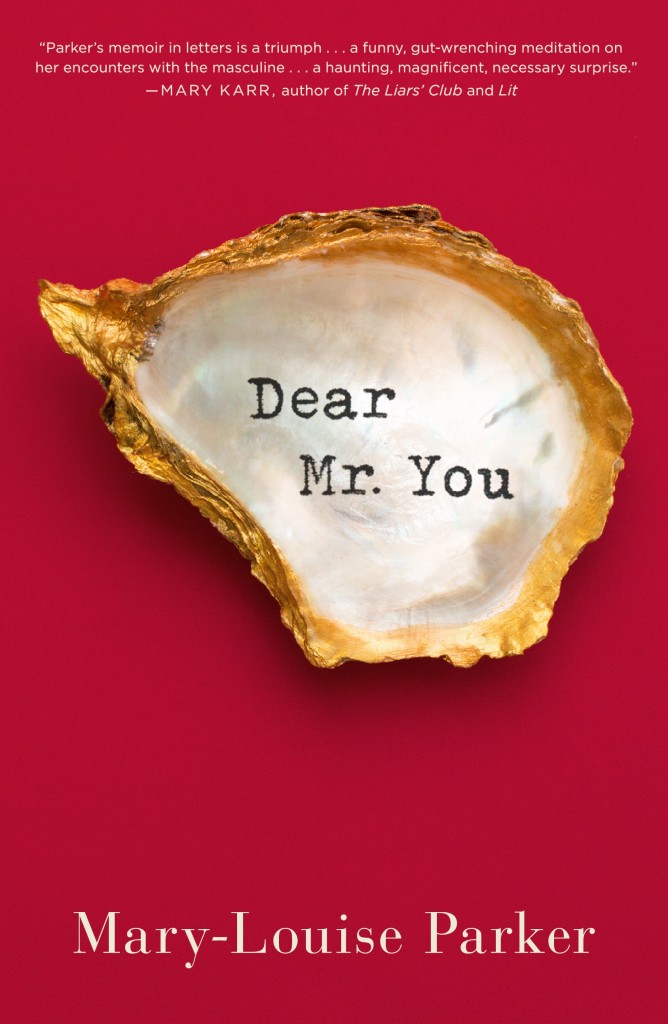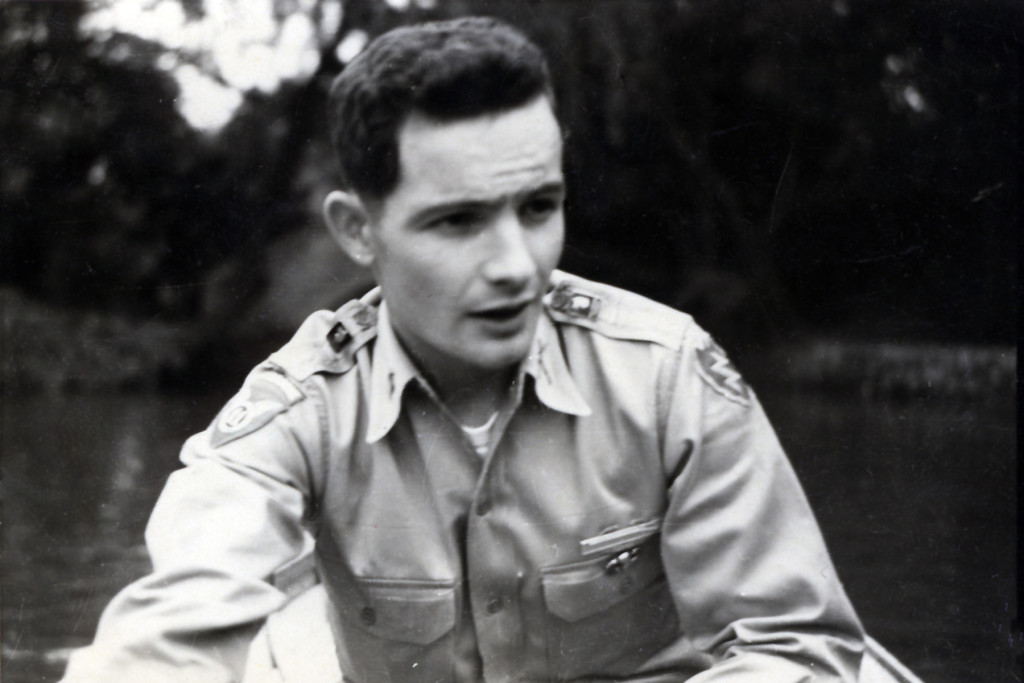The Emmy-winning actress talked to Brendan about her debut book, “Dear Mr. You,” which is a collection of open letters to various men. In this excerpt, she tells a tale that spans three generations of her family.

Dear Grandpa,
The world is at war again. That’s twice now, in your lifetime.
Your only son has been overseas for eleven months. The last you heard, he and his fellow soldiers were going to make a beachhead landing on the shores of the Philippines. If your boy John was involved you can bet it went off like gangbusters. He is nineteen years old and remarkably good at life.
If there were a way to spy on him at this moment you’d see a young man wrapped inside an army-issue poncho and sleeping in the corner of a rice paddy. Artillery is firing across the road but that sound is lost in the rain, which falls in thick black sheets, and your boy sleeps long enough for that rain to surround and lift him. When he wakes he is floating on his back.
He will hit the double decades in two and a half weeks and you have a plan that’s been brewing.
You go to the only bakery you know, which is two towns over. The woman behind the counter is wiping her eyes on her apron by the time you ask to buy the biggest loaf of rye bread she has. She’s just gotten an earful about your son and refuses to charge you for the bread, also throwing in a few cinnamon buns. You thank her up and down and tell her you enjoy the way her blouse matches her eyes.
 You have a bottle of gin for the drive back but you run out of it around the same time you run out of fuel and have to pull over to the side of the road. You hitch a ride back to the house with a nice fellow, a miner like yourself, and tell him about your plan for your son’s birthday. You are open to strangers. Aside from that it’s a darn good plan.
You have a bottle of gin for the drive back but you run out of it around the same time you run out of fuel and have to pull over to the side of the road. You hitch a ride back to the house with a nice fellow, a miner like yourself, and tell him about your plan for your son’s birthday. You are open to strangers. Aside from that it’s a darn good plan.
In forty-three years, your granddaughter will be found hitchhiking by the side of the road near San Francisco. She will stand there with two young men who’ll encourage her to hike up her skirt and look as winsome as possible by the off-ramp. They will have constructed a sign out of cardboard to catch the eye of someone nice enough to pull over. The sign will say MARIN, PLEASE, WE’VE READ SARTRE. They’ll get a ride fairly quickly from a fellow who sees only a girl with a sign, but when he stops the two boys will come running out from behind a bush. The boys will stuff themselves in that tiny car and thank the man for his generosity before he can protest.
In an hour or so your granddaughter will enter a coffee shop with one of the boys. They will have empty stomachs and less than two dollars between them. They have a plan though. The girl goes off to a corner table by herself while the boy scans the joint for someone to beat at poker. She will eat breakfast slowly, setting down her book in between bites of croissant with strawberry jam, only ordering a hot chocolate when the boy gives her the signal that he is winning and they will be able to pay for their food. A man will notice her and attempt to sit across from her, but she will give him a blank stare as she points to the boy, who has seen the man approaching. The boy will narrow his eyes and give him the universal signal for SCRAM, and as the man skulks away she will go back to her book, which is, incidentally, The Age of Reason by Jean-Paul Sartre. It will start to rain as the group drives across the Golden Gate Bridge. Your granddaughter loves the rain as you do, the grandfather she’ll never meet. By the time she’s born you are dead and your wife has married your brother. Your granddaughter never thought much about the fact that instead of “Grandma and Grandpa,” it was always “Grandma and Uncle George.” When she gets older she’ll wish she’d met you, as you are the subject of many stories that are told and retold within the family.
It’s better that you know none of this now though, as you return home and head to the kitchen. You get a handful of crackers from the bread tin to eat with liverwurst before you set about your business. You put the loaf of bread on the counter and look at it for a moment. This makes you smile. The sight of the bread, and your own cleverness; they almost make your eyes wet.
You slice the bread through the middle and dig out the guts down to the crust. Picking out the innards, you ball them up in your hand and stash that fist-bread in the icebox for your wife to come across. She may need them as meatloaf filler if she’s short some beef. You are always thinking of others.
You take the bottle of hard Kentucky whiskey from its bag and admire the label, which is blurry. You nearly fall off the kitchen stool trying to read it. A sip of moonshine from a jar in the icebox feels like a swell idea. You stand with your hand on the refrigerator door and sway, letting the cold out.
The candle is a problem. You have a heck of a time finding one and have to wake your wife, who swears at you. When you say it’s for the boy’s birthday, she walks to the neighbors’ in her housedress to ask for one. You admire her attack on life, as you watch her heading back up the driveway with a candle stub, highly perturbed. You get a kick out of the whole exercise.
The candle drips wax around the bottle top and creates a seal to protect the whiskey. You lay the sacrificial bottle in the crust coffin, for the second time thanking the powers that be for making you so goddamned ingenious. Splashing Worcestershire in the remains of the frosting creates a tinted batch with which to spell “Happy Birthday John!” The exclamation point looks like a tadpole but that adds mystery. You chuckle as you wrap it up.
When your boy sees a box with his name on it, he tears it open for any sign of home. He’d been digging foxholes to wait out the night when the first load of mail in weeks reached him by way of New Guinea. The sound of his name being called to receive a package is almost gift enough.

He digs through the newspaper and finds your cake, by now pitiful and moldy. It’s bald in patches where the icing has rubbed off, but it’s from you so he knows to look beneath the surface for the joke. He unties the twine around the bread and looks inside, letting go a belly laugh and waving his hand up to the sky. The other soldiers slap him on the back and wish him happy birthday while eyeing the bottle’s throat like the slope of a woman’s neck they could grasp with their muddy frozen hands.
John says a toast to you before passing it around and everyone joins in on the “hip-hip hooray!” The irony of celebrating is lost on those young men who are swimming in mud and sharing a tin of sardines for dinner. They raise up their rifles and fists to the skies, believing they won’t have their last drink in the middle of this paddy. There will be real parties waiting back home and a chance for a fella to put on a clean shirt and tie, hear the ice clink in a decent glass of gin. The day when this is the story told while sitting in a real chair.
For now they let out their best cheer. It doesn’t rouse you from where you lie facedown on the rug in West Virginia, talking to a son lost too deep in the jungle to hear you. You wonder if they have the same locusts in that part of the world where your boy is now. Locusts. You are fond of the sound but they ruin discovery. The way they rise and fall in the same exact patterns every night tells you what time it is before you get a chance to peek out a window for yourself, see where the moon ended up tacked to the sky.
Excerpted from Dear Mr. You by Mary-Louise Parker. Copyright © 2015 by Loon, Inc. Excerpted with permission by Scribner, a Division of Simon & Schuster, Inc.


